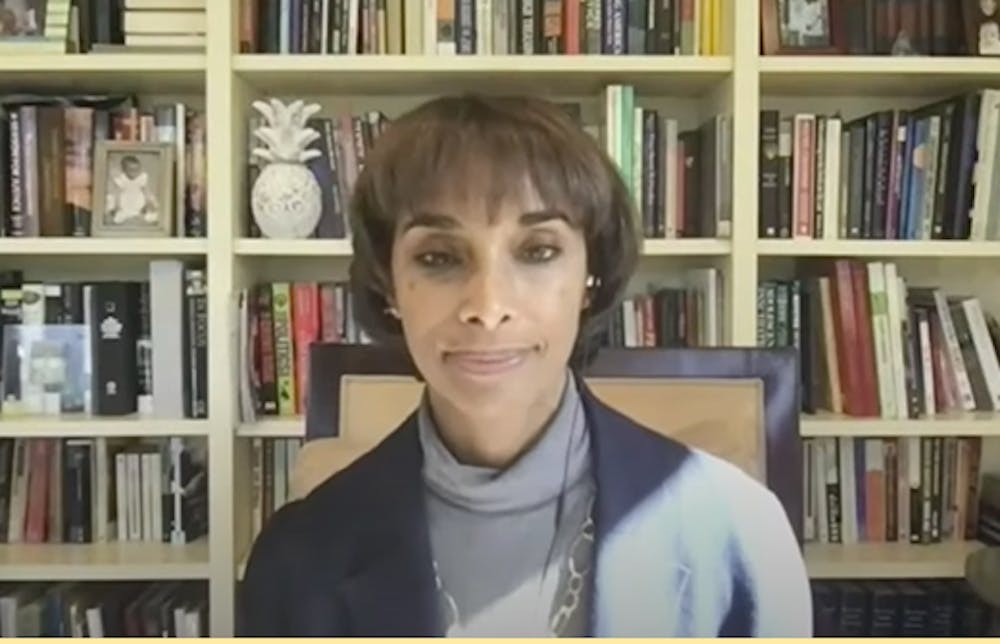On Thursday, Jan. 28, Cecilia Rouse, former dean of the University’s School of Public and International Affairs (SPIA) testified to the U.S. Senate Committee on Banking, Housing, and Urban Affairs during her virtual nomination hearing.
Rouse, nominated by President Joe Biden to chair the Council of Economic Advisers (CEA), spoke about the economic challenges caused by the COVID-19 pandemic as well as her experience in researching inequality.
If confirmed, she would head an agency tasked with advising the President on matters relating to both the domestic and international economy.
Sens. Bob Menendez (D-N.J.) and Cory Booker (D-N.J.) introduced Rouse to the committee.
“Dr. Rouse’s experience in both the Obama and Clinton administrations as well as her academic expertise make her imminently qualified for this role,” Sen. Menendez said in his introduction.
From 1998–99, Rouse advised President Clinton on the National Economic Council. She was also a member of President Obama’s CEA from 2009–11, where she worked to revive the economy and restore the labor market during the Great Recession.
Sen. Booker later emphasized that if Rouse is confirmed, she would become the first Black leader of the CEA and the fourth woman to hold the position. He explained that her expertise qualifies her to address the ongoing economic crisis and, particularly, its effects on women, people of color, and middle class families.
“She will not just make history if confirmed, though,” Booker added. “I am confident she will help to shape a future that is more resonant with our common values as a people.”

In her opening statement, Rouse described how she initially became interested in labor economics when she enrolled in her first economics class at Harvard University. Unemployment had been rising at the time, she said, and she wanted to learn more about its causes. Throughout her career, she studied the intersection of economic opportunity and education.
“Today our country’s living through the worst economic crisis since the Great Depression,” she said. “Millions of families have had their lives turned upside down — the economic security they worked so hard to build eroded almost overnight by the economic impact of the pandemic.”
Rouse explained that she would provide “objective economic guidance” to the Biden-Harris administration with the goal of creating a stronger economy than before the COVID-19 pandemic, referring to President Biden’s “Build Back Better” economic recovery initiative.
This guidance would depend on using “the right data,” Rouse added. She commented on how a focus on average outcomes often overlooks the experience of “people who are left behind, particularly people of color.”

Rouse then answered questions from committee members.
In response to a question from Sen. Elizabeth Warren (D-Mass.) about the importance of reducing wealth inequality, Rouse said, “Closing the wealth gap is not about trying to literally take away [wealth], but it’s trying to ensure that everybody can participate in this economy.”
When pushed by Sen. John Kennedy (R-La.) to explain what measures will be taken to address income and wealth inequality, Rouse said that she would study a wide range of options and work with President Biden “to try to impose taxes in the most efficient way.”
Following the hearing, Rep. Don Beyer (D-Va.) wrote in a statement, “Cecilia Rouse is among a long list of barrier breaking Biden nominees, and after listening to her testimony today it is not hard to see why.”
In the next steps of the confirmation process, the Senate Committee will present Rouse’s nomination to the full Senate for debate and a vote.
Meanwhile, SPIA continues to search for Rouse’s successor. The University has organized a committee consisting of nine faculty members, Christian Potter ’22, president of the Undergraduate Student Government, and Susan Ragheb GS. Mark Watson, professor of economics and public affairs, is now serving as Acting Dean until the new SPIA Dean is appointed.
The confirmation hearing for Rep. Marcia Fudge (D-Ohio), nominated by the President to head the Department of Housing and Urban Development, occurred simultaneously.








